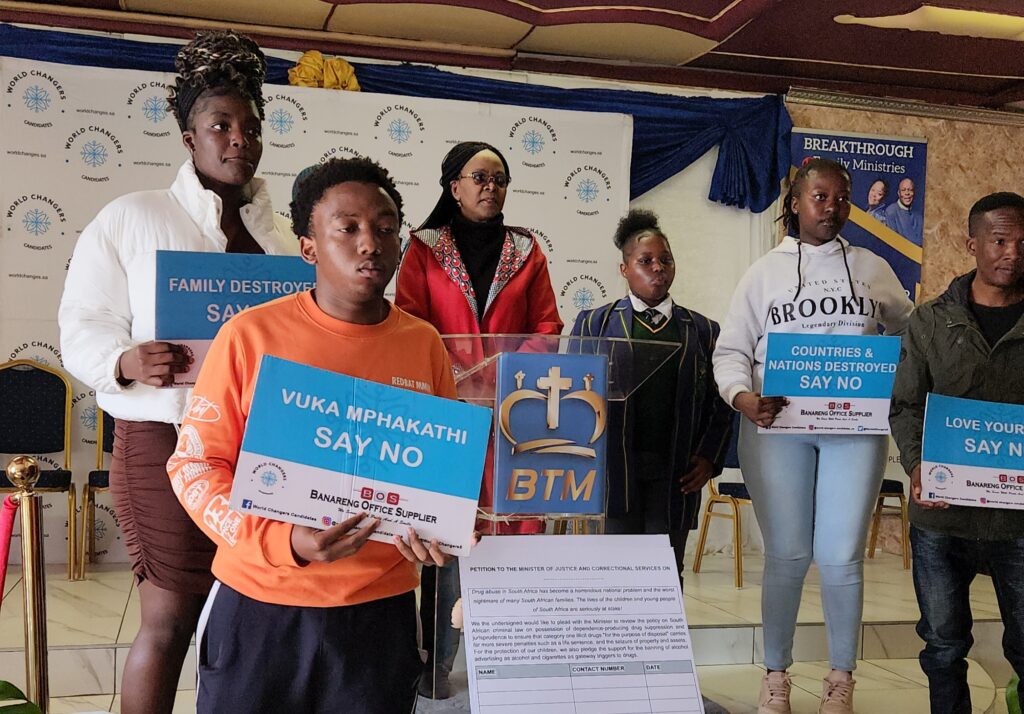Launched on Change.org by South Africa’s anti-drug NPO, the World Changers Candidates (WCC), the petition proposes for the South African courts to mete out harsher penalties for drug crimes, including life imprisonment for those convicted of producing, supplying or selling prohibited narcotic drugs.
While doing so in line with the promotion of Human Rights can be tricky, the organisation believes the measure could prove to be a more effective deterrent to counter the drug problem in South Africa, which the organisation argues is exacerbated by the country’s relaxed drug possession laws.
Currently, being found in possession of dependence-producing drugs such as cocaine, heroine and crystal meth (known as tik in South Africa) can result in just a mere fine, or an imprisonment of up to 15 years at most.
We spoke to Lucas Mahlakgane, the Chairperson of South Africa’s anti-drug NPO, World Changers Candidate (WCC), who led the organisation’s call for harsher drug laws on Wednesday (June 26) – as the world observed International Day Against Drug Abuse and Illicit Trafficking, also known as World Drug Day. The organisation is appealing to the powers that be to take a tough stance against those who profit off the drug trade – at the expense of hundreds of thousands of innocent lives.
“The message is very simple,” he said. “Because we don’t have death penalty in here unlike other countries, we are saying ‘once you’re caught with drugs, there should be no bail, no parole’. It must be life for life because drugs cost lives.”
His words are a clarion call for urgency in dealing with drug crimes “as the drug scourge in South Africa has reached dire proportions,” added Mahlakgane, whose organisation’s past successful campaign against the passing of the BELA Bill (which sought to allow the sale of alcohol in schools) proved once again that change – while often slow – is most likely to happen through pressure from civil society.
Highlighting the urgency to address South Africa’s growing drug problem as a shared responsibility, the organisation’s latest plea (petition) coincides with President Cyril Ramaphosa’s pledge to prioritise efforts to combat drug use and trafficking in his 2024 inauguration speech. “We cannot rest until criminals are off our streets and the drugs are out of our communities,” President Ramaphosa said.

CDA supports WCC’s call for tough drug laws
Over the years, the country has seen a growing number of people abusing drugs, with 80% of SA’s male youth death related to alcohol, and drug consumption reported to be twice the world norm (SAMRC, SACENDU 2021). Worst still, the number of people who use drugs is predicted to significantly increase by 2030 (UN report) with a 40% rise expected in Africa as a whole.
Another major concern problem is the issue of underage drinking, which has been on the rise with the prevalence of ‘pens down parties’, hosted to celebrate the end of exam writing.
We have several incidents where pupils have died or suffered physical violence while at these booze-fueled gatherings. One such a case is the 2022 Enyobeni Tavern tragedy – which resulted in the death of 21 youngsters during a ‘pens down’ party. The youngest pupil was only 13 years old.
Tragic incidents like these calls for drastic action, hence a petition of this nature, which has drawn support from the Central Drug Authority (CDA). The organisation (CDA) works with law enforcement authorities and NPOs around the country to address substance abuse and it’s effects on communities and families. With respect to WCC’s latest pettition, CDA Chairperson Nandi Mayathula-Khoza, pledged her full support, highlighting the need to accelerate the implementation of evidence-based drug prevention interventions; “starting with families – as parents we need to talk to our children, as young as they are about the dangers of drugs,” she says. “And to the people who sell drugs and alcohol to minors – the shebeens, the taverns – we say that must actually end.”
Mayathula-Khoza added: “The message is also about what’s happening today, and the World Changers Candidates are saying ‘let’s look at these laws, the policies that the government are implementing. Are these effective? When these programs are implemented in communities, do we see change? Or should we really look at these policies and pieces of legislation, and change them so that it’s not easy for people who traffic drugs and gangsters, criminals and those people who sell drugs to our children and get off scot-free after they’re arrested’. So there must be harsher sentences, and we need to work together to identify those pieces of laws,” she said referencing the Liquor Amendment Bill, which was passed in 2016 and is currently being reviewed to add restrictions on the advertising of alcohol.
“This is what this day is all about,” she said. “We need to ensure there’s effective drug law policies that must be rooted in science, research and in full respect of human rights to ensure that children and young people are protected. And to ensure that drugs dealers spend a long time in prison because they do not belong in our communities.”
She further acknowledged the petition by the WCC, and the need for the organisation to take it up to the Minister of Justice, “and I will say take it up to the President because he (President Ramaphosa) has spoken in his inauguration speech that ‘we can not rest until criminal drug syndicates are taken away from our communities’.”
In closing, she said CDA is currently looking into the exciting Drugs and Drug Trafficking Act 140 of 1992 “to ensure that it has some teeth because we can’t keep talking and talking, but we don’t see some difference. It must have teeth, and those who sells drugs and give alcohol to minors must rot in jail.”
Watch the rest of her speech below:
